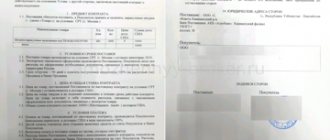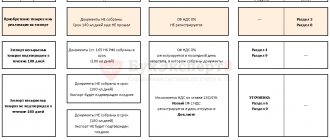How to keep records of goods exports
Export in economics refers to the export of goods abroad for sale or processing. Goods exported outside the state are recorded by the customs service and drawn up with the relevant documents. Documents accounting for and accompanying the export of goods abroad of the Russian Federation must be drawn up in accordance with the current laws of Russia.
The main laws regulating foreign trade activities are the Federal Law “On Currency Regulation and Currency Control” No. 173-FZ dated December 10 and the Law “On the Fundamentals of State Regulation of Foreign Trade Activity” dated December 8, 2003 No. 164-FZ.
Law No. 173-FZ defines:
- rights and obligations of persons participating in foreign economic transactions;
- currency regulation authorities and foreign exchange control authorities;
- rights and obligations of currency control authorities and agents.
In accordance with Federal Law No. 164-FZ, goods fall under the customs export procedure if the following conditions are met:
- for transactions that are not subject to statutory benefits, all export customs duties have been paid;
- all restrictions and prohibitions are observed;
- For goods included in the consolidated list, a certificate of origin is presented.
Read the article: Modern structure of Russian exports
Work according to the first option
The implementation of this option involves significant costs. The costs are especially high in the first stages. If you choose the B2C scheme, you will have the opportunity to sell products using one of the methods presented below:
- Through a network of popular stores;
- Through our own retail outlets;
- Via the Internet
The procedure for exporting goods
Exporting to the People's Republic of China is as follows:
- The exporter enters into a contract with the buyer. Primary documents are drawn up and an agreement is concluded.
- An exporter is looking for a company to deliver products.
- Customs registration and clearance.
- Payment of duties.
- Registration of declaration for export of products.
- Delivery of goods to the buyer in China.
If an exporter is just starting out, it is better to use the services of professionals who will help complete the procedure in compliance with all standards.
There are a number of problems that you may encounter. This:
- The need to register a legal entity. To do this, you need to carefully study local legislation and find a person capable of supervising the work of a company in another country;
- Customs formalities. Products must be exempt from duty. It is important to think through the import registration process in advance and find out what documentation is required for this purpose;
- Construction or rental of a warehouse that could be used for storing products. This is true even if you plan to sell your products through virtual stores.
The problems listed above are the most common, however, there is a possibility that other difficulties may arise.
Accounting for goods export operations: required documents
When exported from Russia, the goods are taken outside the Russian Federation for subsequent processing or sale, that is, without the right of return. Export is subject to the payment of duties. Their size depends on various reasons and, in particular, is determined by the value of the exported goods, which is declared in the customs declaration. When carrying out export operations, there is a certain procedure.
Accounting for the shipment and sale of goods for export is carried out separately from accounting for the activities of the enterprise in the Russian Federation. The document flow uses primary documents confirming the shipment of goods, their payment, and the services of intermediaries.
All goods transported abroad of the Russian Federation are subject to mandatory customs clearance, which can be carried out:
- by the exporter himself,
- his customs representative,
- by another person on the basis of a power of attorney.
A package of supporting documents is attached to the declaration presented to the customs authority. It is allowed to provide documents in copies, and the customs authority has the right to check any of them for compliance with the original.
Read the article: Customs transit of goods
What to expect?
Success in the Chinese market largely depends on investing in consumer analysis. The market, although gigantic, is far from being as simple and chaotic as it seemed five years ago. The psychology of Chinese clients is not so different from Russian clients, so our marketers can easily and quickly grasp the specifics and come up with excellent, beautiful ideas that will work in the eastern market. And failures can also happen among international giants. Coca-Cola was able to enter the Chinese market only the second time, adapting its brand to the local audience. Unlike the rest of the world, in China the name of the drink sounds like “ky-ko-ky-la”, which is similar to the Chinese “I’m thirsty.”
In addition to marketing tasks that require integration into the local culture, purely legal obstacles will also arise on the path of Russian exporters. For example, Chinese law requires registration of a company with a sufficiently large authorized capital. If you are importing a food product or a product that comes into contact with the skin, its certification may take from three to six months, and you will need to go through a bunch of additional procedures.
Yes, the costs of starting a business in China will be quite high, but the profitability of the business is also high. Let’s take, for illustration, a Russian manufacturer with a product designed for network distribution. The standard payment deferment in China is the same as in the Russian Federation - 60-90 days. But at the same time, the market is several times and even orders of magnitude higher than in Russian regions. Plus constant costs for promotion and marketing to fight competitors and continue to attract and retain customers.
China is changing rapidly, the market is becoming saturated, and competition is growing. And if five years ago China was literally a Klondike, now the market has become more orderly, regulated, and complex. Previously, to foreign ones, now this is not the case: both business and consumers have become more cynical and demanding. Today, working with China should be treated as a complex and long-term project, from which you should not expect quick super-profits.
Konstantin Bushuev , co-founder of Xiao Long Group
Accounting for export of goods
To obtain reliable information, accounting for the export of goods is carried out in separate sub-accounts, which makes it possible to separate ordinary and foreign economic activities in accounting. Features of accounting and tax accounting for the export of goods include:
1. Settlements under an export contract are most often carried out in foreign currency. To do this you need:
- open foreign currency accounts for each currency separately, and use account 52 in accounting for settlements with the counterparty: Dt 52 Kt 62;
- master currency purchase and sale transactions and reflect them in the report, using account 57 for this purpose (or account 91 depending on the adopted accounting policy):
Dt 57 Kt 52;
Dt 51 Kt 57;
Dt 91 Kt 57 or Dt 57 Kt 91;
- keep records of settlements for each transaction simultaneously in two currencies: foreign and Russian;
- carry out a revaluation of currency balances and debts of counterparties (in currency terms) both on the date of the transaction and on the reporting date, using for this account 91: Dt 91 Kt 52, 62 or Dt 52, 62 Kt 91.
2. Accounting for the export of goods is maintained by the enterprise separately from other accounting, which is due, on the one hand, to the requirements of the law, and on the other hand, to the need to achieve the following goals, which include:
- separation of data on accounting for the export of goods from information on activities subject to VAT at other rates or exempt from this tax (clause 4 of Article 149 and clause 1 of Article 153 of the Tax Code of the Russian Federation);
- control over the completeness of receipt of payment from foreign counterparties (clause 1 of Article 19 of the Federal Law “On Currency Regulation...” dated December 10, 2003 No. 173-FZ);
- taking advantage of the opportunity not to charge VAT on advances received from foreign buyers (clause 1 of Article 154 of the Tax Code of the Russian Federation);
- monitoring compliance with the deadlines required to confirm the right to use the zero rate (clause 9 of Article 165 of the Tax Code of the Russian Federation);
- tracking the moment of transfer of ownership of the goods if, according to the international rules for the interpretation of trade terms "Incoterms", it does not coincide with the moment of shipment;
- correct correlation of shipment volumes, which is necessary when calculating VAT.
3. Additional operations arise to account for the export of goods:
- calculation of customs duties and fees (account 76):
Dt 76 Kt 51 (52);
Dt 44 Kt 76;
- in case of a discrepancy between the moments of transfer of ownership of the goods and the moment of shipment, account 45 is used to account for it:
Dt 45 Kt 41 (43);
Dt 90 Kt 45;
- restoration of VAT accepted for deduction and then attributed to export operations (clause 6 of Article 166 of the Tax Code of the Russian Federation);
- penalties and fines for VAT on exports not confirmed on time are charged on Dt 91 Kt 68;
- for unconfirmed exports, VAT is written off as other expenses (Dt 91 Kt 19), three years from the end of the tax period in which the corresponding shipment was made.
The most time-consuming part in accounting for the export of goods is VAT postings. Correct VAT accounting makes it possible to obtain a tax deduction if the right to apply the zero VAT rate is confirmed. In this regard, special attention should be paid to:
- accounting for taxes related to direct export costs;
- distribution of VAT on indirect costs to determine its part attributable to exports;
- correct execution of documents relating to VAT;
- compliance with deadlines for preparing documents confirming the right to tax deductions;
- restoration of VAT accepted for deduction and then attributed to export transactions;
- compliance with the established deadlines for tax accounting when exporting goods for unconfirmed, as well as for later confirmed deliveries;
- a high probability of discrepancy between the accounting periods for export shipments for profit tax purposes and confirmation of the right to deduct VAT on it, which leads to a discrepancy between the tax bases for profit and VAT in the same tax period.
VAT on export costs is accumulated on account 19 with its allocation to a special sub-account: Dt 19 Kt 60.
The tax previously accepted for deduction, when accounting for the export of goods, is restored at the time of their shipment by posting: Dt 19 Kt 68.
The tax on indirect costs is redistributed on account 19 with the transfer of the export part of the tax to the subaccount: Dt 19 Kt 19.
If documents appear confirming the possibility of applying a deduction, then tax is written off from account 19 in the amount corresponding to the documents: Dt 68 Kt 19.
Tax on exports not confirmed on time is charged to the subaccount of account 19: Dt 19 Kt 68.
In this case, the tax on expenses related to it is taken for deduction: Dt 68 Kt 19.
Penalties and VAT fines for exports not confirmed on time are charged on Dt 91 Kt 68.
If the export is subsequently confirmed, then this part of the tax is accepted for deduction (clause 10 of article 171, clause 3 of article 172 of the Tax Code of the Russian Federation): Dt 68 Kt 19.
For unconfirmed exports, VAT is written off as other expenses - Dt 91 Kt 19 - three years from the end of the tax period in which the corresponding shipment was made.
Read the article: Analysis of Russian exports
Microelectronics, pharmaceuticals and cosmetics: what the capital’s business exports to Europe
In the first nine months of 2021, the capital's non-resource non-energy exports to Europe doubled and amounted to $15.3 billion. At the end of the same period last year, this figure was $7.8 billion.
“The capital’s exports to Western European markets increased by 218.9 percent in the first nine months of 2021 and amounted to $11.7 billion. Thus, in the first three quarters of 2021, non-resource non-energy exports to the Netherlands amounted to $348.88 million and compared to the same period in 2021, non-resource non-energy exports increased by 9.7 percent. Among the growing positions are electronic integrated circuits - exports almost doubled, to $2.74 million, pharmaceutical products - almost 18 times, to $1.17 million, cosmetics - three times, to $0.67 million “, said Vladimir Efimov, Deputy Mayor of Moscow for Economic Policy and Property and Land Relations.
From January to September, the capital's exports to Northern European markets increased by 9.1 percent to $615.86 million. The leading markets in this direction were Denmark, with an increase of 51.1 percent, and Norway - 16.8 percent. The growth in exports to Denmark is due to the expansion of the range of products in the capital, in particular due to the supply of low-voltage distribution equipment - they began to be exported to this region only in September. The leading Moscow export product group to Norway was mechanical equipment, machinery and computers. The total supply in this case was $2.13 million.
“As part of exports to Europe, the volume of exports to the Baltic countries also increased; according to the results of nine months, it doubled and amounted to $276.11 million. Thus, the volume of exports to Latvia increased by 31.5 percent and amounted to $79.15 million; deliveries to Estonia increased by 418.3 percent and amounted to $151.18 million,” said Alexander Prokhorov, head of the Moscow Department of Investment and Industrial Policy .
The pharmaceutical and cosmetics industries played a key role in increasing exports from Moscow to Latvia. Thus, the capital’s export of pharmaceutical products increased by 57.12 percent, and the export of makeup and skin care products increased by 31.3 percent. The leader in supplies to Estonia is the products of the chemical industry (aromatic fuel processing products, an increase of 329.58 percent, and metal oxides - 5.22 percent), as well as medical instruments and devices - exports increased by 119.39 percent.
To realize a successful export, exporting companies need to carry out thorough research into the conditions of the markets of interest; it is important to understand the needs of the foreign market, know the internal legislation of countries and understand issues of certification and logistics. Comprehensive support for metropolitan companies to enter foreign markets is provided by the Department of Investment and Industrial Policy of the City of Moscow, and the Moscow Export Center, subordinate to the Department of Entrepreneurship and Innovative Development of the City of Moscow.
“European countries are among the key importers of products from capital companies. Enterprises supplying goods to this region have free participation in business missions, leading specialized exhibitions and festivals as part of the “Made in Moscow” program. For example, despite closed borders, 24 animation studios this year took part, with the support of the city, in the traditional film market in Annecy, France, which was conducted online. Based on its results, contracts worth over 1.4 million rubles have already been concluded, negotiations based on the results of the meetings are ongoing. This year also saw a multi-industry online business mission with the participation of potential partners from Germany. In addition, the capital’s exporters have the opportunity to receive 10 percent of completed contracts in the form of grants and reimburse costs incurred when selling products abroad with the help of subsidies,” said Alexey Fursin, head of the capital’s Department of Entrepreneurship and Innovative Development.
Thus, a capital company supplying chemical products to Germany and an individual entrepreneur from Moscow exporting equipment for quests to the Netherlands received a subsidy to reimburse the costs of transporting goods abroad. Another Moscow enterprise was able to reimburse from the city budget the costs of patenting its holographic matrices supplied to Switzerland. And the developer of IT solutions for monitoring prices and assortments of competitors used the service of free selection of potential foreign buyers, and also received a free gold account on Alibaba.com and a premium account on Europages.com.
Personal research: how the Moscow Export Center helps to enter foreign markets In all key regions of the world: capital business is increasing exports
Features of tax registration
When goods cross the border, the exporter charges and pays VAT at the usual rate. The basis for calculating VAT is the amount consisting of the value of the goods according to the declaration, as well as duties and excise taxes. If VAT is not paid, the goods will not be able to leave the temporary storage area at customs. If payment is late, a penalty will be charged on the unpaid amount. Upon subsequent confirmation of export, the exporter has the right to deduct the amount of paid “unconfirmed” VAT if the following conditions are met:
- The goods have been registered.
- Revenue from transactions with goods is subject to VAT.
- All primary documents for the goods and their transportation have been collected.
- Customs VAT has been paid in full.
If a simplified taxation scheme is used, then when accounting for the export of goods, VAT is not applied to the deduction. In this case, actions with VAT depend on what object of taxation is used. If “income” is used as the object of taxation, then VAT is included in the cost of the goods or fixed assets. When applying the “income minus expenses” scheme, the tax amount is included in the costs that reduce the taxable base.
Results
Reflection of export-related transactions in accounting occurs with certain features.
They are determined both by the need to use those accounting accounts (or analytics on them) that may not be in demand in the absence of exports, and by the special procedure for conducting transactions on VAT accounts. You can find more complete information on the topic in ConsultantPlus. Free trial access to the system for 2 days.
Accounting for the export of goods outside the Customs Union
Below is a table with questions related to the export of goods, tax and accounting of export transactions, which most often arise in the practical activities of exporters. For each of them, the table provides links to the relevant legal acts in which answers to them can be found. We are talking about accounting for the shipment and sale of goods for export outside the Customs Union.
A detailed analysis of accounting for the export of goods requires a large amount of information about the market, which the enterprise often does not have. Therefore, it is worth turning to professionals. Our information and analytical department is one of those that stood at the origins of the business of processing and adapting market statistics collected by federal departments.
Find out more
Quality in our business is, first of all, the accuracy and completeness of information. When you make a decision based on data that is, to put it mildly, incorrect, how much will your loss be worth? When making important strategic decisions, it is necessary to rely only on reliable statistical information. But how can you be sure that this information is reliable? You can check this! And we will provide you with this opportunity.
You can find out all the details by calling: +7 (495) 565-35-51 and 8 .
Request a call back
Where can I find information?
In my opinion, in addition to economic incentives, Russian entrepreneurs would benefit from special government programs to support exports: the more diverse, the better. It is very important to convey information to people correctly; in modern conditions, it has become profitable not only to export something from China, but also to export your own goods there. This is a market with a billion customers, which is several times larger than the Russian market. In addition, our economic problems are not there: consumer demand is not falling, but, on the contrary, growing every year.
I advise interested entrepreneurs to take a closer look at the Russian Export Center, which provides good informational, organizational and even financial support.
Services for smooth export to China from Russia
Despite its strong reputation as the world's leading exporter, China is actively increasing imports of various categories of goods into its country.
Exporting goods to China will be comfortable if you do not forget about all the nuances and keep the entire process under control from start to finish. Due to a small error in the declaration or the absence of a mandatory document, difficulties may arise: an increase in customs clearance time, violation of contract terms, decreased customer confidence, penalties and other losses.
We know how to avoid this and offer several cooperation options for you to choose from:
- Full outsourcing. We send goods to China with full support: we fill out documentation, develop a foreign economic agreement, obtain approvals and licenses, insure products, organize logistics, organize customs clearance in Russia, provide support at all stages of delivery;
- Agency support for foreign trade participants. We check the integrity of the counterparty and the quality of the goods, communicate with foreign partners, draw up the necessary certificates, approvals, licenses and other documents as required by Russian legislation;
- Contract holder mode. We export to China on behalf of our specialized company: we purchase goods from a Russian counterparty directly, on our own behalf we organize customs clearance under our foreign trade agreement and deliver to a foreign partner;
included in the register of customs representatives
We bear full responsibility to customs and the client for the quality of services provided
Instructions for productive cooperation
If you act as a supplier of products, then you should find people in China who are ready to purchase them. Here it is recommended to proceed according to the following scheme:
- Ensure cooperation with an enterprise operating in China. Provide them with the necessary data regarding the products you plan to sell. Representatives of the company make the necessary calculations and send a commercial proposal;
- Confirmation from the client. In this way he expresses his readiness to make a purchase. After this, a formal contract is drawn up and concluded. Due to this, the new business partner ensures implementation;
- The products are shipped to China. At the same time, business partners carefully monitor that payment is received into the account on time. Next, the funds are transferred to the sender, that is, you;
- An order placed by a buyer from China is sent for shipment. At the same time, various documentation is completed;
- The buyer receives the products he ordered.
To successfully sell products, you need to create a standard package of business papers. When collaborating according to the above scheme, you can count on the help of a business partner.










